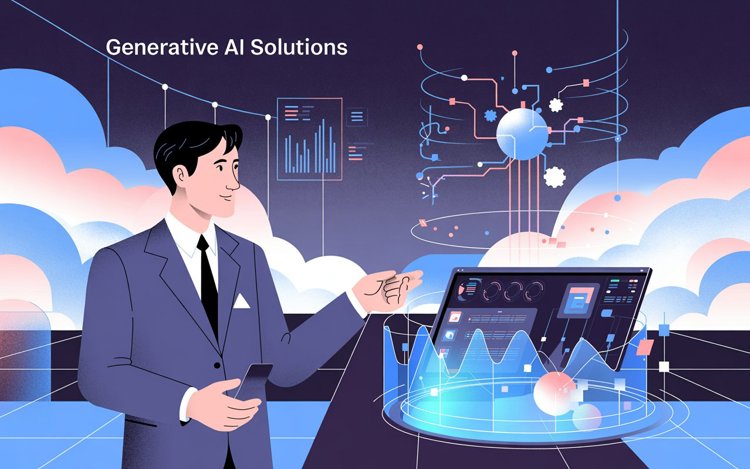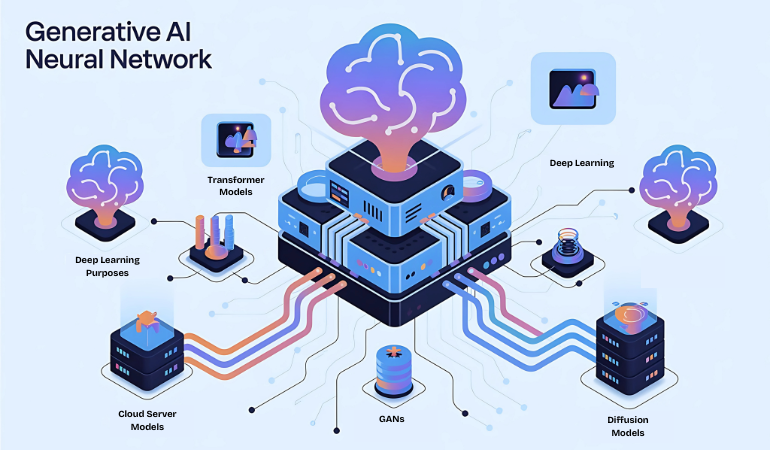Generative AI for Enterprises: Boosting Efficiency in Software Solutions

Naapbooks Insights • AI for Enterprises • 5 min read
- What is Generative AI and Why Should Enterprises Care?
- How Generative AI Transforms Business Operations
- Where Generative AI Really Shines
- Guide of Generative AI Architecture
- How To Implement Generative AI For Your Enterprise?
- Understanding ROI and Business Value of Generative AI
- Challenges and Considerations of Generative AI Landscape
- Future Trends for Generative AI in Enterprise
- How Expert Help Makes A Difference In Implementing Generative AI
- Welcoming The Exciting World Of Generative AI
The digital transformation landscape is experiencing a revolutionary shift, and at the heart of this transformation lies generative artificial intelligence. For enterprises seeking to modernize their operations, enhance productivity, and drive innovation, generative AI has emerged as the game-changing technology that's reshaping how businesses approach software development, content creation, and data analysis.
What is Generative AI and Why Should Enterprises Care?
Generative AI represents a revolution in artificial intelligence capabilities, moving beyond traditional rule-based systems to create original content, code, and insights. Unlike conventional AI that simply analyzes existing data, generative AI learns from vast datasets to produce entirely new outputs – from writing sophisticated code to generating complex financial models that can transform how enterprises operate.
For businesses operating in today's competitive marketplace, the question isn't whether to adopt generative AI, but how quickly they can integrate these powerful tools into their existing workflows. The technology promises to unlock extraordinary levels of creativity while simultaneously driving operational efficiency to new heights.
How Generative AI Transforms Business Operations
Code Generation and Software Development Revolution
The most immediate impact of generative AI for software development is visible in code generation capabilities. Enterprise development teams are discovering that AI can produce clean, functional code in multiple programming languages, dramatically reducing development time and costs. This isn't just about simple script generation – we're talking about complex application architectures, database designs, and even entire microservices frameworks.
Modern enterprises are witnessing development cycles that previously took months, are now being compressed within weeks. The technology excels at generating boilerplate code, creating API endpoints, and even suggesting optimization strategies that human developers might overlook. This acceleration doesn't replace human creativity; instead, it amplifies it, allowing developers to focus on strategic problem-solving rather than repetitive coding tasks.
Content Creation at Enterprise Scale
Beyond code generation, AI-powered content creation is revolutionizing how enterprises approach marketing, documentation, and communication. From generating detailed technical documentation to creating personalized customer communications, generative AI enables businesses to maintain consistent brand voice while scaling content production exponentially.
The financial services sector, in particular, is experiencing remarkable transformation. Companies can now generate compliance reports, risk assessments, and market analyses with unmatched speed and accuracy. The technology understands context, maintains regulatory compliance, and produces outputs that meet stringent industry standards.
Where Generative AI Really Shines
FinTech and Financial Services Innovation
The generative AI applications in fintech are particularly compelling. Financial institutions are leveraging AI to generate sophisticated trading algorithms, create personalized investment strategies, and develop predictive models for risk management. The technology can analyze market patterns, generate trading signals, and even create comprehensive financial reports that would traditionally require hours of manual analysis.
Machine learning in enterprise solutions is enabling financial companies to process vast amounts of transaction data, identify potential fraud patterns, and generate real-time insights that drive business decisions. The integration of AI with blockchain technology is creating new possibilities for secure, transparent, and efficient financial operations.
Manufacturing and Supply Chain Optimization
Manufacturing enterprises are discovering that generative AI can create optimized production schedules, generate predictive maintenance protocols, and even design new product configurations based on market demand patterns. The technology analyzes historical data, market trends, and operational constraints to generate solutions that human planners might not consider.
Supply chain management is being revolutionized through AI-generated logistics plans, inventory optimization strategies, and demand forecasting models. These solutions adapt in real-time to changing conditions, ensuring enterprises maintain optimal efficiency even in volatile market conditions.

Guide of Generative AI Architecture
Machine Learning Models and Neural Networks
The backbone of enterprise AI solutions lies in sophisticated neural network architectures. These systems learn from massive datasets, understanding patterns, relationships, and contexts that enable them to generate new content. The technology employs transformer models, diffusion networks, and generative adversarial networks (GANs) to create outputs that are often identical from human-generated content.
For enterprises, understanding these technical foundations is crucial for making informed decisions about implementation and integration. The choice between different AI models depends on specific use cases, data requirements, and desired outcomes.
Cloud Computing and AI Infrastructure
Cloud-based AI solutions provide enterprises with the scalability and flexibility needed to implement generative AI effectively. Cloud infrastructure enables businesses to access powerful computing resources without massive capital investments, making advanced AI capabilities accessible to organizations of all sizes.
The integration of AI with cloud computing creates opportunities for seamless scaling, real-time processing, and global accessibility. Enterprises can deploy AI solutions across multiple geographic locations, ensuring consistent performance and compliance with local regulations.
How To Implement Generative AI For Your Enterprise?
Assessment and Planning Phase
Successful AI implementation for businesses begins with comprehensive assessment and strategic planning. Organizations need to evaluate their current technological infrastructure, identify specific use cases where AI can provide maximum value, and develop implementation roadmaps that align with business objectives.
The planning phase should include stakeholder engagement, risk assessment, and resource allocation strategies. Enterprises must consider data privacy requirements, regulatory compliance, and integration challenges that may arise during implementation.
Integration with Existing Systems
Enterprise software solutions must seamlessly integrate with existing business systems to provide maximum value. This integration requires careful consideration of data flows, API compatibility, and workflow optimization. The goal is to enhance existing processes rather than disrupt them entirely.
Modern integration strategies employ microservices architectures, API-first approaches, and containerized deployments that enable flexible, scalable AI implementations. These approaches ensure that AI capabilities can evolve alongside business requirements.
Understanding ROI and Business Value of Generative AI
Productivity Gains and Cost Savings
The business benefits of generative AI are measurable and substantial. Organizations report productivity improvements ranging from 30% to 300% in specific use cases. Code generation reduces development time, content creation scales marketing efforts, and data analysis provides faster insights for decision-making.
Cost savings extend beyond direct labour reductions. Enterprises experience reduced error rates, improved quality consistency, and faster time-to-market for new products and services. These improvements translate directly to competitive advantages and increased profitability.
Innovation and Competitive Advantage
Generative AI enables enterprises to explore new business models, develop innovative products, and enter new markets with reduced risk and investment. The technology provides capabilities that were previously impossible or prohibitively expensive, creating opportunities for differentiation and market leadership.
AI-driven innovation becomes a core competitive advantage, enabling enterprises to respond quickly to market changes, customer demands, and technological disruptions. Organizations that embrace generative AI position themselves as industry leaders and attract top talent and investment.
Challenges and Considerations of Generative AI Landscape
Data Quality and Privacy Concerns
Enterprise AI challenges include ensuring data quality, maintaining privacy compliance, and managing security risks. Generative AI systems require high-quality training data, and enterprises must implement robust data governance frameworks to ensure optimal performance and compliance.
Privacy regulations like GDPR and CCPA require careful consideration when implementing AI solutions. Organizations must balance the benefits of AI with the need to protect customer data and maintain regulatory compliance.
Ethical AI and Responsible Implementation
The power of generative AI comes with significant responsibilities. Enterprises must consider ethical implications, bias prevention, and transparency requirements when deploying AI solutions. Responsible AI implementation includes ongoing monitoring, bias detection, and continuous improvement processes.
Organizations should establish AI ethics committees, develop clear usage policies, and implement monitoring systems that ensure AI outputs align with company values and societal expectations.

Future Trends for Generative AI in Enterprise
Multimodal AI and Advanced Capabilities
The future of generative AI trends points toward multimodal systems that can process and generate text, images, audio, and video simultaneously. These advanced capabilities will enable even more sophisticated applications, from automated video production to comprehensive market analysis that incorporates multiple data types.
AI automation for enterprises will expand beyond current capabilities to include complex decision-making processes, strategic planning, and even creative problem-solving. The technology will become increasingly autonomous while maintaining human oversight and control.
Industry-Specific AI Solutions
The evolution toward custom AI solutions will accelerate, with vendors developing specialized tools for specific industries and use cases. Financial services, healthcare, manufacturing, and retail will see increasingly sophisticated AI applications designed specifically for their unique requirements.
This specialization will enable deeper integration, better performance, and more relevant outputs for specific business contexts. Enterprises will benefit from AI solutions that understand industry-specific terminology, regulations, and best practices.
How Expert Help Makes A Difference In Implementing Generative AI
Choosing the Right Technology Partner
Successful generative AI implementation requires expertise, experience, and ongoing support. Enterprises benefit from partnering with technology companies that understand both AI capabilities and business requirements. The right partner provides not just technical implementation but strategic guidance, best practices, and continuous optimization.
When evaluating potential partners, consider their experience with similar implementations, their understanding of your industry, and their ability to provide ongoing support and evolution of your AI solutions.
Comprehensive Support and Evolution
The most successful AI implementations involve ongoing partnership relationships that evolve with changing business needs and technological advances. Naapbooks Limited has been at the forefront of technological innovation for almost a decade, specializing in AI, machine learning, and blockchain solutions that drive business transformation.
Our experience in developing sophisticated financial technology solutions, combined with our expertise in AI and machine learning, positions us to help enterprises navigate the complex landscape of generative AI implementation. From initial assessment through deployment and ongoing optimization, we provide comprehensive support that ensures your AI investments deliver maximum value.
Welcoming The Exciting World Of Generative AI
The transformation brought by generative AI represents more than just a technological upgrade – it's a fundamental shift in how enterprises approach creativity, efficiency, and innovation. Organizations that embrace these capabilities today position themselves for sustained competitive advantage in an increasingly digital marketplace.
The journey toward AI-powered enterprise operations requires careful planning, expert implementation, and ongoing optimization. However, the rewards – increased productivity, reduced costs, enhanced innovation, and improved customer experiences – make this investment essential for forward-thinking organizations.
As we look toward the future, generative AI will become increasingly integrated into every aspect of business operations. The question isn't whether your enterprise will adopt these technologies, but how quickly and effectively you can implement them to drive meaningful business transformation.
The time to act is now. The enterprises that invest in generative AI today will be the market leaders of tomorrow, leveraging unprecedented capabilities to create value, drive innovation, and achieve sustainable competitive advantages in their respective industries.










